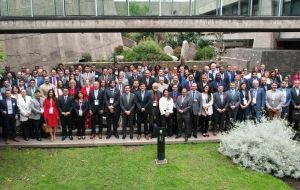MercoPress. South Atlantic News Agency
ECLAC convention agrees on need to deepen regional cooperation in digital transformation
 “Today we are gathered to define a new Digital Agenda for Latin America and the Caribbean,” Uruguay's Virginia Pardo said
“Today we are gathered to define a new Digital Agenda for Latin America and the Caribbean,” Uruguay's Virginia Pardo said Dignitaries in Santiago (Chile) attending the two-day Economic Commission for Latin America and the Caribbean's (ECLAC) Ninth Ministerial Conference on the Information Society advocated Thursday for deepening regional cooperation in digital transformation through concrete actions and projects.
They also highlighted the new phase initiated by the institutional arrangement known as eLAC which is about to celebrate its 20th anniversary and which allows working on a Digital Agenda for Latin America and the Caribbean.
This week's convention which lasts through Friday seeks to approve a new Digital Agenda for the region that will make it possible to advance in a digital transformation that will help overcome the traps that inhibit its development, the organizers explained.
Thursday's opening session was attended by Chilean Ministers Alberto van Klaveren (Foreign Affairs), Juan Carlos Muñoz (Transport), and Aisén Etcheverry (Science), in addition to Colombia's Information Minister Óscar Mauricio Lizcano Arango and other visiting officials from Uruguay and the United Nations, who were all hosted by ECLAC's Executive Secretary José Manuel Salazar-Xirinachs, among other authorities.
”I would like to thank, on behalf of the Government of Chile, ECLAC for convening this Ministerial Conference on the Information Society in Latin America and the Caribbean, where Chile has the honor of assuming the Presidency of the Digital Agenda for Latin America and the Caribbean (eLAC) for the period 2024-2026,“ van Klaveren said.
”Meetings such as these days allow us to address as a region the scope of the Global Digital Pact, recently adopted at the Summit of the Future, and explore its implementation through the eLAC2026 Agenda. This will allow us to ensure that our region's vision plays a role and has an effective impact on the development of global technological governance,“ he added.
Muñoz stressed the need to address as a country and region the necessary regulations to make the ”zero digital divide real“, so that ”no one is left behind.”
Uruguay's Agency of Electronic Government and the Information and Knowledge Society (AGESIC) Information Society Area Director Virginia Pardo explained her country's actions as Chair of the Presiding Officers of the Ministerial Conference on the Information Society between 2022 and 2024.
Next year, she said, 20 uninterrupted years of the regional Digital Agenda will be celebrated, “which has objectives and goals, which poses challenges and which is fundamentally a space for dialogue and collaborative action”. “Today we are gathered to define a new Digital Agenda for Latin America and the Caribbean,” a key instrument to guide national digital policies, she said.
UN Envoy Amandeep Singh Gill pointed out in his telematic appearance that “the Global Digital Compact links all the new issues in this area with a holistic approach that recognizes the interaction between development, the digital economy, human rights and online security, data and, of course, artificial intelligence. It has enabled the emergence of a new field for global digital cooperation.”
Also Thursday, the ECLAC unveiled its new Digital Transformation Laboratory, an initiative implemented jointly with the Deutsche Gesellschaft für Internationale Zusammenarbeit (GIZ) and financed by the German Federal Ministry for Economic Cooperation and Development (BMZ). The Lab is conceived as a space for experimentation and innovation in which policymakers, technology specialists, academics, and other stakeholders collaborate to address the challenges associated with digitalization and define concrete actions.




Top Comments
Disclaimer & comment rulesCommenting for this story is now closed.
If you have a Facebook account, become a fan and comment on our Facebook Page!